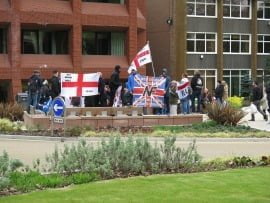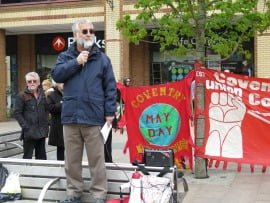Saturday 2nd May saw trade unionists in Coventry celebrate May Day in the city centre. Over 100 trade unionists convened to hear speeces from comrades in the labour movement, and to discuss how to fight austerity and the far right. Darrall Cozens, President of the Coventry TUC, reports.
Saturday 2nd May saw trade unionists in Coventry celebrate May Day in the city centre. Despite the relatively short notice sent out jointly by Coventry TUC and Coventry Against Racism (CAR), about a 100 trade unionists convened in Broadgate to listen to speeches from fellow trade unionists, as well as from members of the audience who were invited by the rally chair to come and make a contribution if they so wished.
It was short notice, as in recent years May Day had been celebrated in Transport House, the Unite building on the edge of the city centre. It had been planned for this year to be the same, as Unite were to move in to a new building and the closure of the old one was to be celebrated with May Day festivities. Unfortunately, there has been a delay in building the new offices due to medieval foundations being found on site.
Fight to change society
At the rally Tony Conway spoke on behalf of CAR, the CTUC Secretary Jane Nellist on behalf of NUT, George Sands on behalf of UNISON, Unison rep Dave Kersey on behalf of UAF, Dan Crowther from the campaign to keep libraries open, the former Coventry MP Dave Nellist, and a young member from the audience on LGBT rights.
In opening the rally, the CTUC President reminded comrades of the origins of May Day in the killing of four demonstrators by the police at a rally held during a general strike on 4th May 1886 in Chicago – a strike to achieve the division of the day into 8 hours at work, 8 hours for recreation and 8 hours for rest. Almost 130 years later, due to the current crisis of capitalism, we have our class facing drastic falls in living standards, an increase in the precarious nature of work, a rising concentration of wealth at the top as evidenced by the Sunday Times Rich List, a housing crisis, and increasing poverty for many at the bottom of society.
In closing the May Day celebrations, the CTUC President made reference to what faces working class people if capitalism continues. The IMF has coined the term of secular stagnation, an epoch we are in of low economic growth rates, accompanied by rising inequality where it is cheaper to employ workers on temporary or zero hour contracts with minimum wages rather than invest to upgrade the productive forces. Such a period will challenge the perceived “wisdoms” of reformism – the adherents of which believe that this crisis is temporary, will soon pass, and that we will soon be back to a land of “milk and honey”. Even the political representatives of capitalism in the UK have stated that once the deficit has been eliminated and current expenditure is in balance, public spending will be at the levels of 1938, as that is all capitalism can afford. Storms are on the way and unless we fight to defend what we have, and in the process fight to change society, the future for working class people is bleak.
Far right disruption
 All photos by A.R.V.W. CoventryThese celebrations were also “enlivened” by a gathering of the West Midlands Infidels, a (even more!) right wing split off from the EDL, in another part of the city centre. There was a heightened police presence, as the WMI had threatened to disrupt our celebrations and many younger members of our crowd wanted to go and confront the WMI meeting. Members of the CTUC hastily convened another open air meeting after the May Day celebrations to discuss and decide if it was feasible to go and confront the WMI given the balance of forces. After a very lively discussion where arguments for and against were put, the meeting decided to stay in Coventry’s central square, Broadgate, and be prepared to defend it against the WMI if they had decided to try and invade our space.
All photos by A.R.V.W. CoventryThese celebrations were also “enlivened” by a gathering of the West Midlands Infidels, a (even more!) right wing split off from the EDL, in another part of the city centre. There was a heightened police presence, as the WMI had threatened to disrupt our celebrations and many younger members of our crowd wanted to go and confront the WMI meeting. Members of the CTUC hastily convened another open air meeting after the May Day celebrations to discuss and decide if it was feasible to go and confront the WMI given the balance of forces. After a very lively discussion where arguments for and against were put, the meeting decided to stay in Coventry’s central square, Broadgate, and be prepared to defend it against the WMI if they had decided to try and invade our space.
The appearance of the WMI sets a dangerous precedent, as they openly display credentials from the days of the National Front in the 1980s. At that time workers also faced growing unemployment, falling living standards and attacks on trade union rights. The NF were active in Coventry and it was no coincidence that the right-wing storm they whipped up ended in the murder of a 24-year-old Sikh, Satnam Singh Gill, in Coventry city centre at Easter 1981 and Doctor Amal Dharry in October of the same year in the Coventry suburb of Earlsdon.
At the moment the forces of the extreme right are miniscule compared to the strength and depth of the labour movement in society, but the emergence of the WMI is a warning. At a time of increasing insecurity – of diminishing hopes amongst the young in particular for a future that is at least as good as if not better than their parents – some will fall for the propaganda of the right to scapegoat migrants for the economic problems. Such a development could divide the working class on the basis of ethnicity, skin colour, religion or sexual orientation. A divided working class will find it far more difficult to fight against the ravages of capitalism.
If we in the labour and trade union movement do not put forward a programme to create jobs, build homes, raise living standards for all, give hope for the future – all of which can only be realised by putting an end to capitalism – the future of humankind will be either socialism or barbarism.






